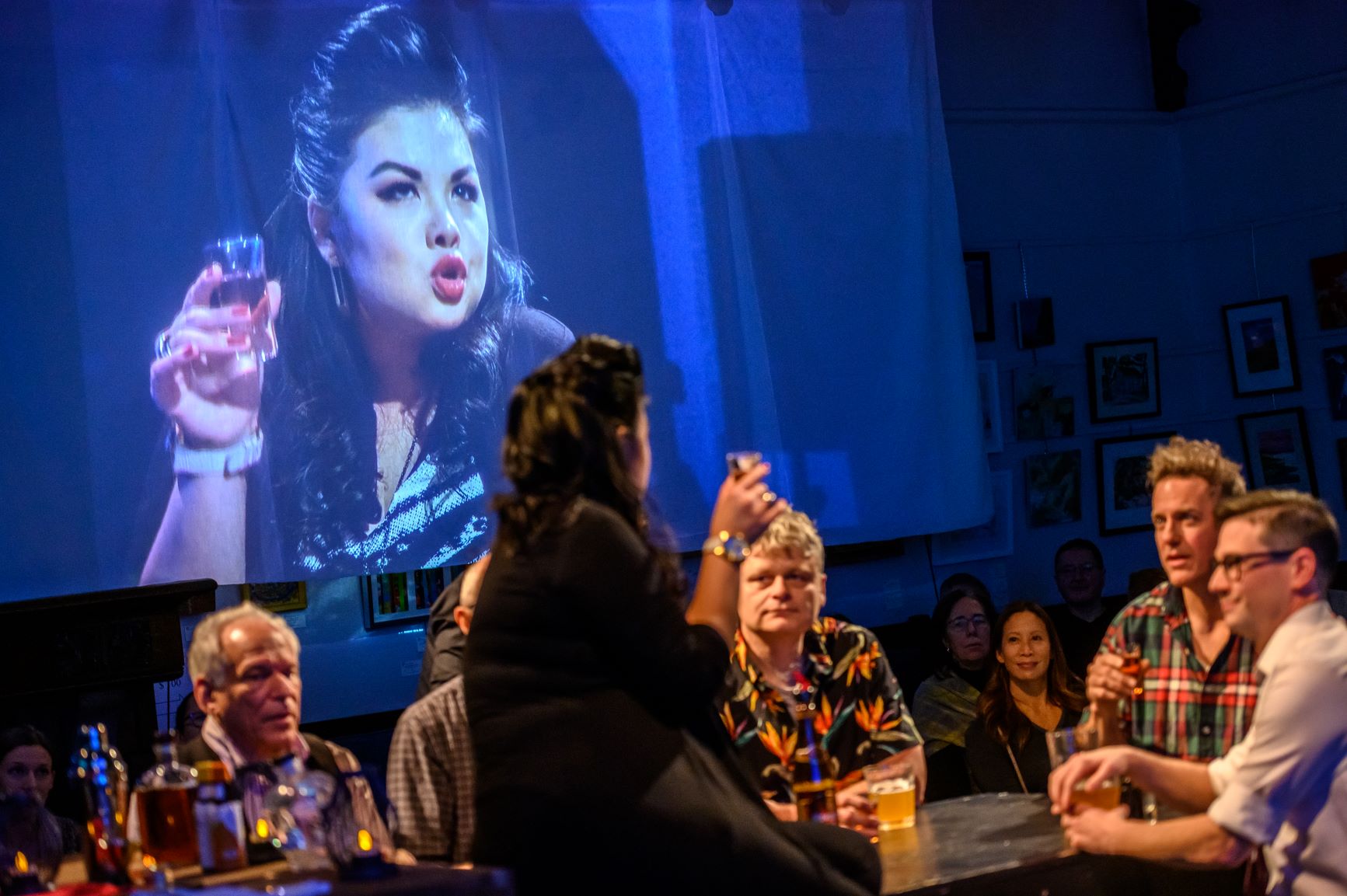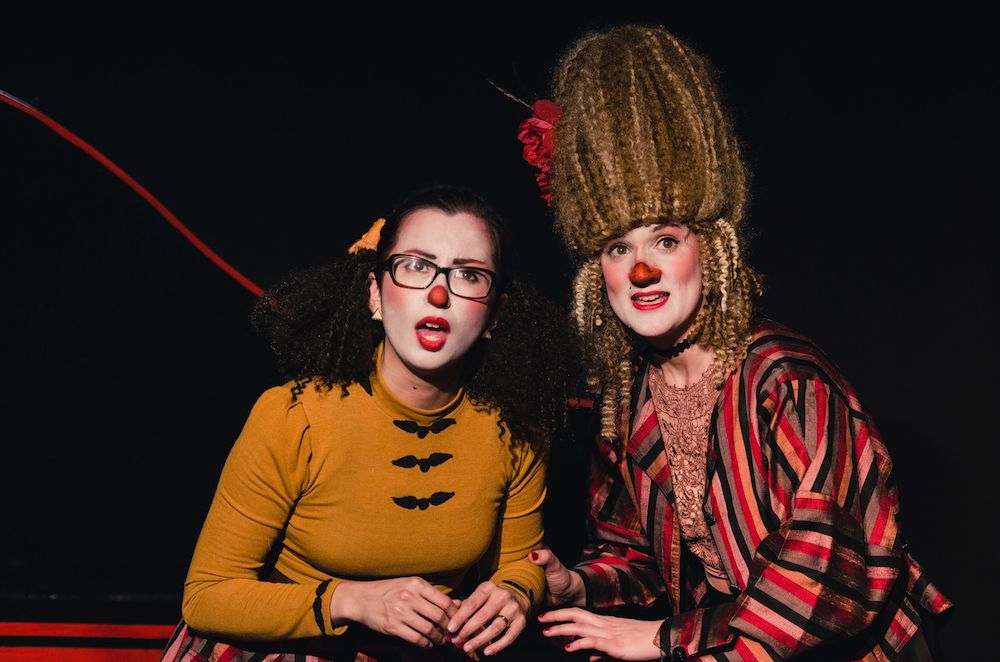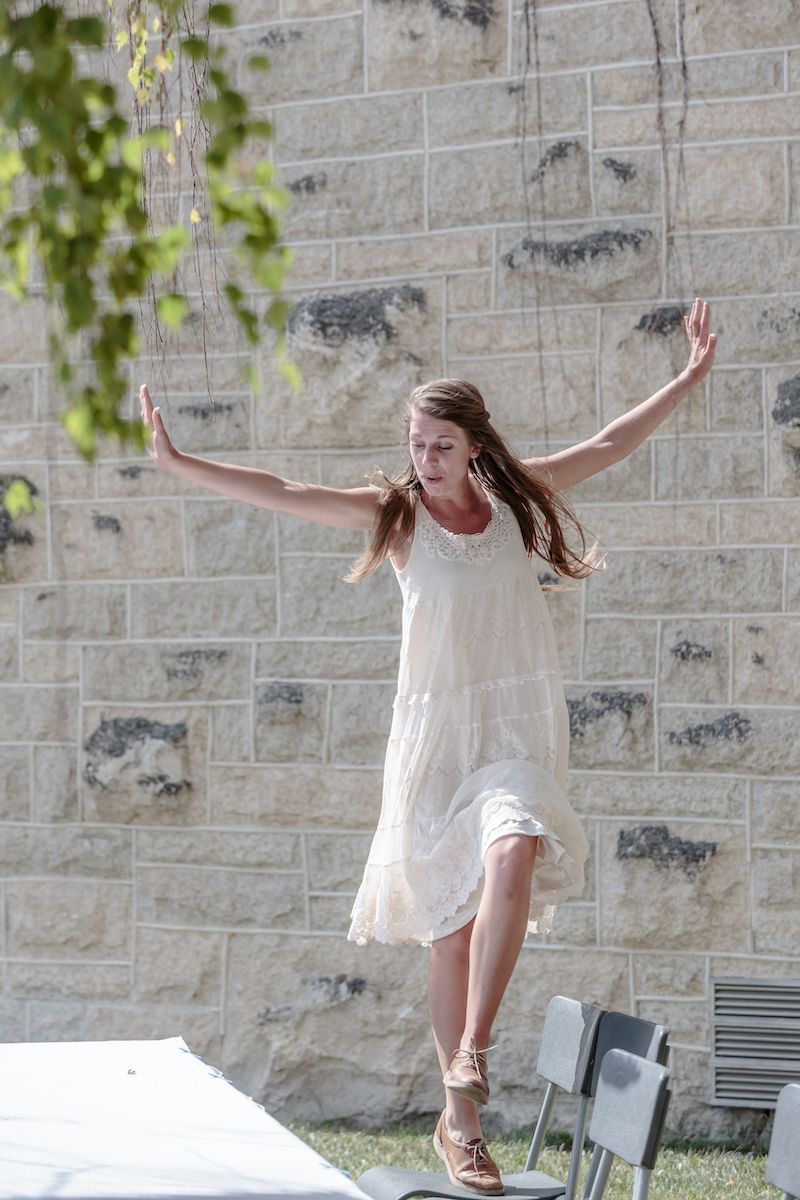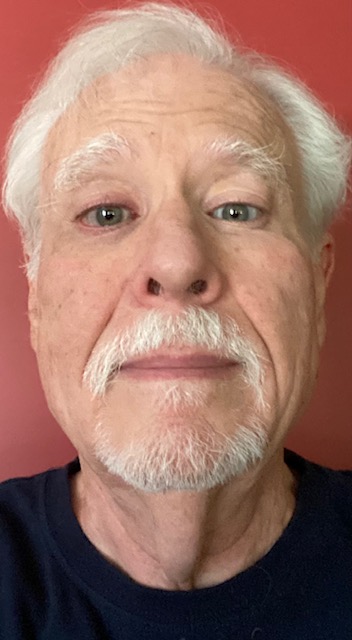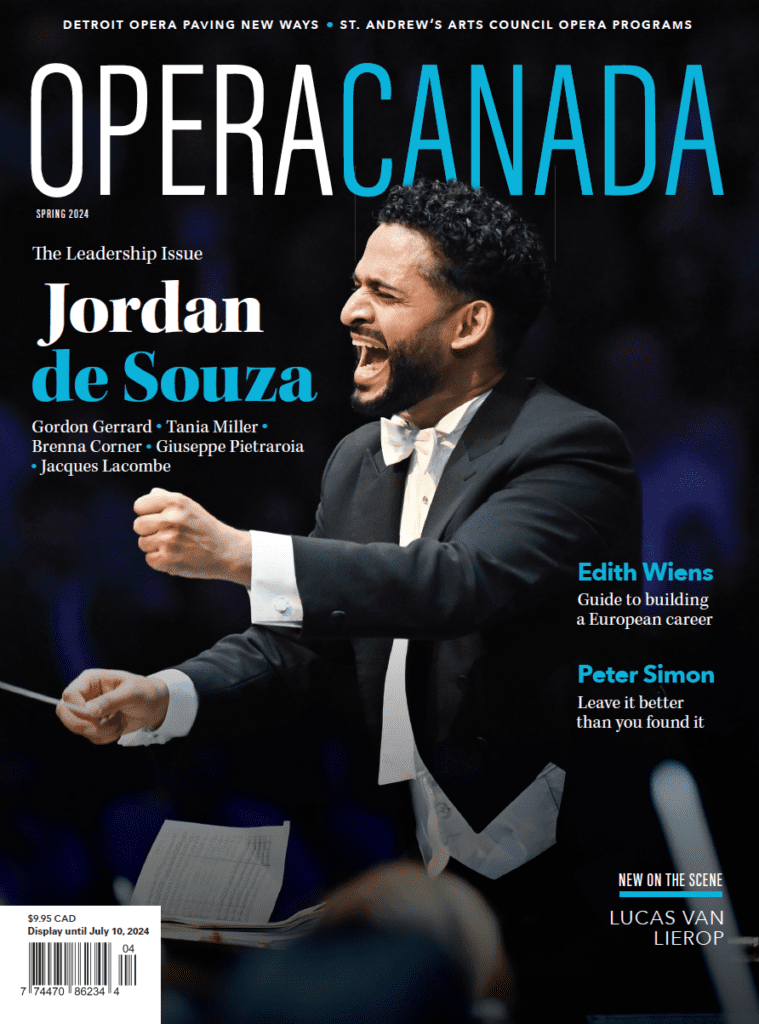This feature on Canadian Indie Opera appeared in the Spring 2020 issue of Opera Canada, Vol. 60 #3
Every business enterprise, large or small, faces similar challenges. Where is the market for what they’re selling? How do they generate cash flow to keep the company afloat and, ideally, growing? How do they judge success? In most cases, it’s the bottom line, but are there other measures as well? Customer satisfaction? Community improvement? Personal esteem?
Opera is a business, and whether we’re talking about an institution like the Canadian Opera Company with its $40-million-plus budget, or a tiny, independent operation with zero staff and negligible other resources, the motivations for creating art and being able to continue to do so are fundamentally the same. But in the world of independent opera, the reasons for persisting are head-spinningly diverse compared to the goals of most established companies.
Independent opera companies fall on a spectrum. Wayne Strongman began Toronto’s Tapestry Opera 40 years ago with a group of like-minded artist colleagues looking for a more challenging repertoire. Tapestry, like many fledgling indies since, has continued to champion new works as its budget has grown beyond $1 million. Some would say it’s gone beyond the notion of an indie enterprise.
And then there are the passion projects, the crusaders, the eclectic creators determined to find work for themselves and for other struggling artists by sheer force of will and self-belief. New companies have been invented out of necessity, to create opportunities for under-employed singers, for instance. Both Toronto’s Opera 5 (2012), led by Rachel Krehm and Winnipeg’s Manitoba Underground Opera (2010), founded by Brendan McKeen with some of his University of Manitoba student associates, launched their foray into the business of opera out of that pragmatism.
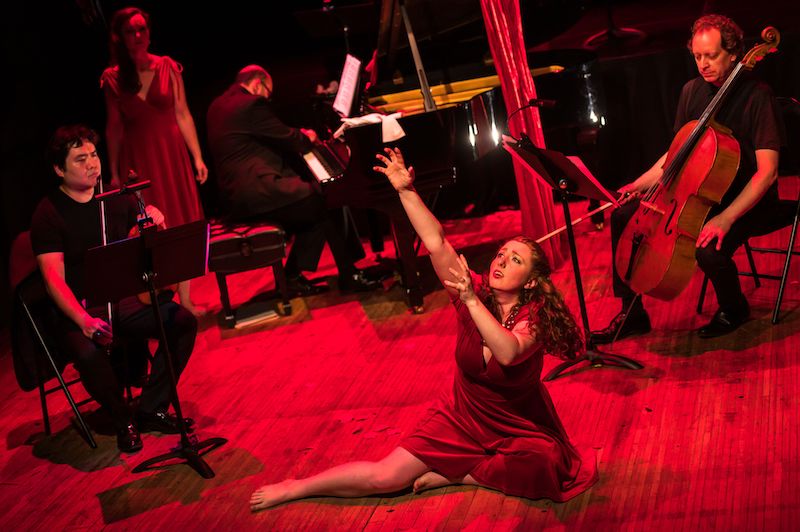
(L-R) Yosuke Kawasaki, Jacqueline Woodley, Vadim Serebryany, Rachel Khrem and Wolfram Koessel in Opera 5’s Open Chambers: Hindemith & Shostakovich, 2018. Photo: Dahlia Katz
And the motivation can get more granular than that. Vancouver’s Opera Mariposa, begun in 2012 by two women who have been friends since grade school, dedicates itself to empowering singers with disabilities, in the broadest sense. The aptly named Heroic Opera, also in Vancouver, offers performance experience to singers with the unique capacity, or at least the ambition, to sing Wagner and Strauss.
Some indie companies hone an extremely precise niche. In 2005, Early Music specialist Suzie Leblanc began Académie Baroque de Montréal, later renamed Le Nouvel Opéra, as a blend of the personal and the professional, even the scholarly.
“My goal was to create an Academy inspired by the literary and musical academies which flourished in Italy in the 16th and 17th centuries: a place to gather and discuss works, their social context, their musical merits and performance practices of the time,” she says. Her personal interests shaped and reshaped her business plan. In 2009, she expanded her mandate to include contemporary work alongside lesser-known chamber works of the Baroque period.
Montréal’s two-woman Opéra 101, founded in 2015, brings the spirit of Anna Russell and Victor Borge to the oftentimes stuffy opera scene, incorporating clowning into polished operatic presentations on a small scale. They were emboldened to persist in their cheeky project after winning $200 at a competition, where they overheard their rivals, decked out in standard diva finery, chatting about the arcana of opera repertoire. Soprano Charlotte Gagnon and pianist Laurence Lambert-Chan came out wearing red clown noses, and showed that opera can sound great and seem ridiculous. They’ve found a local francophone audience for their anti-elitist silliness.
Joel Ivany began Against the Grain Theatre (AtG) in late 2010 to beef up his résumé coming out of UofT’s opera program. That company has, of course, gone on to firmly establish itself in the Toronto indie opera scene, and more recently, as the company has grown, has even toured its pared-down take on La Bohème to local pubs across the country. The CBC added some national cred to the company by picking up one of those Oct. 2019 Bohème performances as the first live-streamed presentation of an opera in the broadcaster’s history.
In the case of the intriguingly named Ne: Sans, Israeli choreographer Idan Cohen has set up shop in Vancouver, where he continues his reach into the international dance world, but is developing a unique amalgam of opera and dance for the local audience, as well. “After a decade of creating and touring with my company internationally, winning awards and gaining recognition, I took my first steps as an opera stage director, doing so through contemporary dance. I felt that there is a real interest in multidisciplinary work within the worlds of opera and dance.” In his company, dance and opera share equal billing with movement offering more than just a charming interlude between sung scenes.
The ambitions of Canadian independent opera companies vary widely. The blue-collar city of Nanaimo just saw its first-ever full production, with piano, of a classic opera (Bohéme) in November. Carol Fetherston, a retiree who was nudged into starting Nanaimo Opera in 2013, ultimately envisions her company performing at the in-demand, 800-seat Port Theatre, which is still out of her price range. Since Vancouver Island Opera’s demise, Nanaimo’s is the only opera company in the ever-growing mid-Vancouver Island region, and Fetherston’s hope is that her own commitment will spark audience growth among a burgeoning island retiree population and some tangible enthusiasm from prospective local sponsors.
Essential Opera, begun in 2010 in Toronto, divides itself between Toronto and Atlantic Canada. Its founders, sopranos Erin Bardua and Maureen Batt, began with a modest staging of Le nozze di Figaro that received encouraging acclaim. They were hooked, and their conservative business plan and artistic goal was simple: “to produce work we wanted to see,” works most traditional opera lovers would call “the essentials.”
Leaders of smaller companies have the same worries as the majors: sustaining themselves financially and cultivating reliable audiences. Most of the small companies I contacted received some government assistance besides what they could drum up through fundraising and ticket sales. Several had loose associations with their more established brethren, working in donated or discounted space, borrowing costumes and other production resources. But in most cases, their funding is soft, a project grant here, term-limited cash there. A few have commercial sponsors; just as many, though, pay for a lot of what they do out of their own pocket. Their own and their crucial volunteers’ in-kind contributions are essential and invaluable.
Loose Tea Music Theatre’s founder and Executive Artistic Director Alaina Viau, who wears the hats of conductor, director and stage manager, offers Toronto audiences what she calls a “revitalized” form of classic opera. Warhorses reimagined, chestnuts roasted in the fire of contemporary sensibilities, especially regarding women’s and traditional outsiders’ roles in society, the company also offers new opera tackling critical social issues. She has been at it since 2013, and offers a view of the future where larger budget companies see the value in affiliating with the nimble indie companies to create a more integrated opera ecosystem.
Fetherston in Nanaimo knows her ultimate destination is a conventional, comfortable, well-equipped, all-purpose theatre. Heroic Opera (2017) and re:Naissance Opera (2017) enjoy the funky Annex, one of Vancouver’s civic theatres, and Astrolabe Musik Theatre (2010) will premiere a new work there in the fall. Other indie outfits, in keeping with their need for economic flexibility and often because their mission is to do opera in unconventional ways, find spaces you’d never think of as opera venues.
Edmonton’s Mercury Opera, founded by Darcia Parada in New York in 1999, has one of the most eclectic histories of staging opera where you’d least expect it. She has taken her penchant for Puccini to the deck of a riverboat, a subway platform, back alleys and fire escapes, a tent in an inner-city park, an outdoor amphitheatre in Alberta’s Badlands, and most recently, a downtown strip club and greasy spoon. She has run her company largely without government assistance or any formal affiliation with a bigger-budget group like Edmonton Opera. (A few of the artistic directors I spoke groaned about the onerous task of grant application writing, the success of which is a crapshoot.) Mercury remains adamantly independent, but for the first time, in March 2020, Parada will present Bohéme in a black box theatre owned by Edmonton’s largest theatre company, The Citadel.
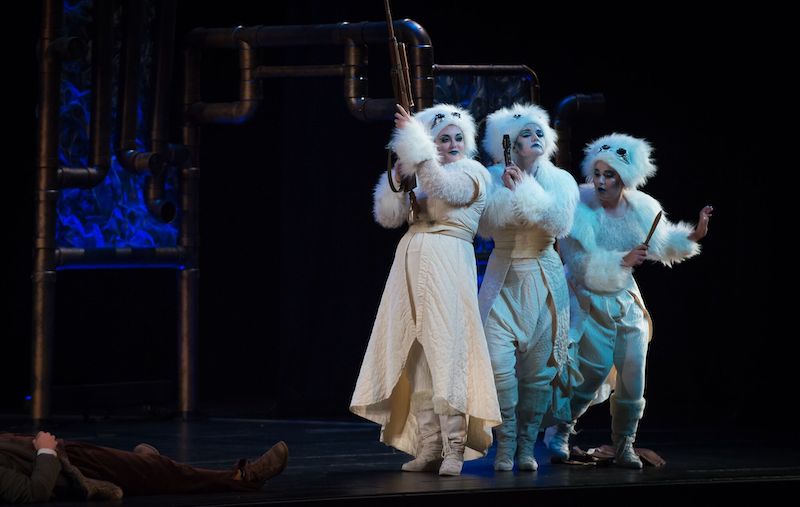
Morgan Traynor (2nd Lady), Juliana Curcio (3rd Lady) and Elizabeth Polese (1st Lady) in Brott Opera’s The Magic Flute, 2018. Photo: Bob Hatcher.
Well-known orchestra conductor Boris Brott began Brott Opera five years ago in response to Opera Hamilton’s folding, a kind of music maker’s labour of love. Opera Hamilton had been a testing ground for new Canadian talent, and Brott felt that besides filling the sudden gap in the options for Hamilton’s opera-loving patrons, the loss of performance prospects for up-and-comers was intolerable. Unlike other smaller opera companies, Brott had the advantage of already running a successful music festival, and so the new Brott Opera, co-directed by Brott and Taras Kulish, had a natural home. And also unlike so many less well-resourced indies, Brott had access to the 2,100-seat FirstOntario Concert Hall, a building he helped design with opera in mind, as well as a reputation as an experienced opera conductor in his own right.
Companies like Edmonton’s Opera Nuova (1998) and Haliburton, Ontario’s Highlands Opera Studio (2007) present a hybrid case. They specialize in extending young artist training by giving them performance opportunities still all-too-rare in their academic programs. Both Highlands and Nuova are overtly educational, but their summer festival formats operate much like any small company would in producing and promoting shows for the general public.

Micah Schroeder (Harlekin) and Melissa McCann (Zerbinetta) in Highland Opera Studio’s Ariadne auf Naxos, 2019. Photo: Brenden Friesen.
Newfoundland and Labrador’s Opera on the Avalon (2009) began as a summer festival featuring emerging artists, mentored by Canada’s best professional singers, as Nuova and Highlands do. It has since become what its founder Cheryl Hickman calls “Atlantic Canada’s opera company,” commissioning new work, such as John Estacio and Robert Chafe’s Ours, about the WWI battle of Beaumont Hamel’s catastrophic effects on Newfoundland’s future. When the production debuted in 2016, one of leads was sung by baritone Brett Polegato, a singer who did his emerging decades ago. This summer, OOTA is co-producing a remounting of the Estacio opera with the National Arts Centre, extending its reach beyond its Avalon Peninsula market. Growth and expansion are on its mind.
Finding co-producers may or may not be a goal for the typical small company, but recognizing that there can be strength in numbers, and ultimately, even survival, umbrella organizations have sprung up to cultivate that cooperative spirit and share creative and material resources. Indie Opera Toronto supports the efforts of at least 11 companies in Toronto, ranging from Tapestry, which gives some critical mass to the venture, to smaller outfits like Loose Tea and Essential.
Tapestry’s General Director, Michael Mori, is on Indie Opera Toronto’s executive committee, and was recently elected board chairman of opera.ca, the national association of opera companies, large and small. Associations like Indie Opera Toronto, and the recently created Indie Opera West (2018), help get everybody rowing in the same direction. At the most basic level, sharing production schedules with one another means less competition for much the same audience.
“Together we’re stronger,” says Mori, who acted, along with B.C. arts consultant Joel Klein and re:Naissance Opera Artistic Director Debi Wong, as advisors for the creation of the west coast co-operative.
“We’re all fighting for the same thing, building a new audience for opera and also giving people opportunities to perform and direct and conduct. By being connected, there’s a better chance that we can create our own scene and create our own network of support.”
Mori believes Vancouver is a leader in showing the way toward opera’s future.
“I think Vancouver is Canada’s most changing city. And so you kind of have to say any classical, European-style company that doesn’t evolve can easily grow out of touch with Vancouver.” Vancouver Opera’s identity challenges may be reflected in this. “The indies are literally reacting to the world that they’re in, and doing so with much lower overhead and more flexibility,” Mori says.
Indie Opera West is already gaining a profile in Vancouver. Spearheaded by Wong, it held its inaugural #IndieOperaWeek in June 2019. The festival continues under the leadership of re:Naissance Opera who are cultivating a relationship with Vancouver Opera. Pacific Opera Victoria is also a contributing member of IOW.
The national association opera.ca also has a role to play in bolstering the opera scene in general. Mori, who comes out of the indie culture himself, sees its duty this way. “Can we connect educators with young artist programs, with independent opera companies, with emerging artists, and summer programs with the professional producers?” The last two opera.ca conferences in Montréal and Vancouver had the indie issue front and centre.
“We’re starting to have a national conversation about the health of opera,” Mori declares.
The fragility of any startup is well-known. Mori describes the arc of the typical indie opera venture as an initial period fraught with potentially fatal hazards. The light at the end of the tunnel is easily extinguished.
“It starts with a collection of people who want to work on the kind of pieces they’re attracted to. They create a passion project for themselves and invite friends to come along for the journey. If it’s successful, they build up a following. Sometimes as their careers grow, their company becomes a little more bona fide.
“There’s like a five-year mark where you go from everyone volunteering and nobody really making money. At that point, you either shut down and move on to other things, or start to pay people and start to innovate and get funding, and stuff like that.” Avalon began paying its singers six years ago.
Associations like Indie Opera Toronto and Indie Opera West provide moral support and a shared sense of community within which companies can pull in some costumes here, and share some volunteers there. Paradoxically, though, an indie company may alleviate some of the insecurities that go with running a small business on a shoestring budget by attaching itself to a larger entity that isn’t really its competitor.
Getting the endorsement and material support of an established organization like the COC and the Banff Centre for Arts and Creativity has helped Ivany’s AtG raise its profile and express its ambitions in ways that many other small companies might envy. In 2016, the COC took Ivany’s company under its wing, giving it a three-year stint as its company in residence. The founding members of AtG had already had an association with the COC as emerging artists and administrative staff. This new relationship with the company coincided with the arrival of Alexander Neef as the COC’s General Director.
“Alexander in his early years referred to us as his kids in some ways because we were all sort of there, and then we started to do our own thing outside of it,” Ivany recalls. Neef became their ally.
This new seal of approval helped grow Ivany’s reputation nationally, and when the Banff Centre was going through its own identity crisis in 2014, it reached out to AtG.
“They were looking into bringing in something different,” Ivany says, and that began an association that led to him becoming Banff’s Artistic Director of opera. In that role, he has helped develop several new productions, including Orphée+, Claude Vivier’s Kopernikus, and most recently, No One’s Safe, described as “a contemporary Mozart mash-up-inspired-murder-mystery.” Most of Ivany’s Banff work ends up on Toronto stages under the AtG banner. In fact, although he still worries about the future, he’s prepared to declare AtG as part of the mainstream Canadian opera scene. Ivany will be going into his sixth season at Banff this summer, where like any indie initiative, he will draw on emerging artists, bend the barriers of the opera genre, and cultivate new audiences for opera in the 21st century.
At the other end of the spectrum where AtG and Tapestry lie, the restless, under-recognized opera artist does more than just fume. The crucible that is indie art continues to produce works that exude their creators’ passions, and makes statements that you won’t hear at companies that have presumptuous names like Vancouver Opera, Calgary Opera, Edmonton Opera, Manitoba Opera, and, most presumptuous of all, the Canadian Opera Company.
Toronto’s fledgling Amplified Opera (2019) was founded by director Aria Umezawa and soprano Teiya Kasahara. Before establishing Amplified, Umezawa co-founded Opera 5, a member of Indie Opera Toronto. Umezawa remembers asking Kasahara a poignant question a couple of years ago. “How much time are we spending on singing, and how much of our energy goes into choosing our audition wardrobe?” Kasahara had to admit, “Most of my energy is on how I’m dressed.” Umezawa drew the conclusion for them that sparked the appearance of Amplified Opera last year. “Teiya. Newsflash. You’re not getting hired now, so what do you have to lose? Why not try expressing yourself in a way that feels honest?”
That honesty has spurred Kasahara to write their own show, The Queen in Me, which received a workshop performance last October, and is expected to premiere in Toronto sometime this year. Here’s how the Globe and Mail’s Jenna Simeonov characterized the turmoil that generated the one-person show:
“Kasahara’s The Queen in Me is the story of the singer’s troubled time on the ground as a queer, Japanese-Canadian, masculine soprano with non-binary they/them pronouns.” Like so many other groups I heard from, something chafing the performer stimulated a structured response, the creation of a company. Opéra 101 felt like tweaking the nose at big-time opera; Amplified’s personal critique of the art, and even more the business, prompted something more militant, perhaps.
“There had been moments in each of our lives where we had been talking about how to rethink the art form, and it was like, ‘Wow! There’s something here.’ So we began talking about a new type of performance art company where we would start by thinking about what we as artists want, and then expand that to give space for others to tell their stories on their own terms,” Kasahara says.
Whether a company grows into a decades-long success story like Tapestry, an early-stage mainstream vehicle like AtG, or is just getting its word out in a small but irrepressible way like the many one and two-person operations out there, the vitality of Canada’s indie opera scene is indisputable. As more and more companies find ways to have one another’s back through regional associations and national entities like opera.ca, the flow of new talent and opera options will, no doubt, continue to flourish, just as the art form as a whole goes through its larger soul-searching project.

